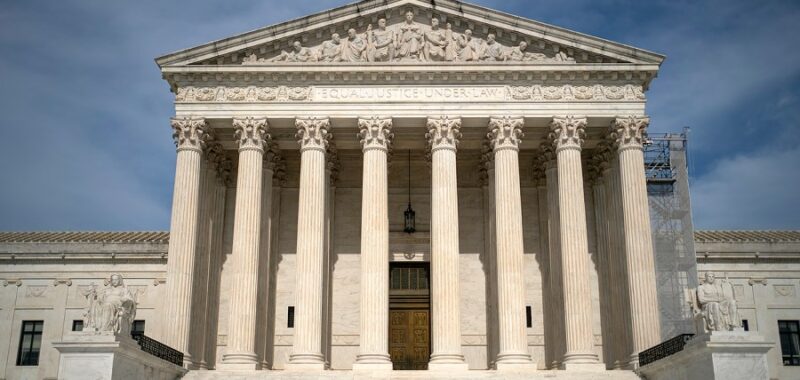
Richard Glossip, an Oklahoma death row inmate, has been scheduled for execution nine times — and each time, he has avoided that fate following legal twists and turns.
Convicted for the 1997 killing of his former boss, Glossip has maintained his innocence for nearly three decades. Now, the state’s Republican attorney general has joined him in urging the Supreme Court to overturn his murder conviction and death sentence to grant him a new, fair trial.
That unlikely turn of events placed the rare capital punishment case before the justices, who will consider Glossip’s latest bid for freedom during arguments on Wednesday.
It’s not disputed that Barry Van Treese, a motel owner and Glossip’s former boss, was beaten to death by maintenance worker Justin Sneed; Sneed admitted to as much. But Oklahoma prosecutors said Glossip ordered him to carry out the crime in a murder-for-hire scheme.
Sneed evaded the death penalty by agreeing to plead guilty and testify against Glossip, instead earning a life sentence in prison for killing Van Treese. Glossip was found guilty and given a death sentence in 1998, but that conviction was overturned due to ineffective counsel on appeal; he was retried in 2004 and again convicted and sentenced to death.
Over the death row inmate’s objections, Oklahoma’s highest criminal appeals court upheld his conviction last year, and an execution date was scheduled for May 18, 2023.
In Glossip’s appeal to the Supreme Court, his attorneys told the justices Sneed, an “indispensable witness” in Glossip’s retrial, was not credible. They claim he lied about drug abuse and a psychiatric condition rendering him “potentially violent” — and that state prosecutors let that lie go uncorrected with the jury.
Oklahoma Attorney General Gentner Drummond (R) has said he does not believe Glossip is innocent. But, in an extraordinary move, he submitted a brief to the justices in support of overturning Glossip’s death sentence following an “unfair and unreliable” trial.
“While the State previously opposed relief for Glossip, it has concluded, based on careful review of new information that recently came to light relating to prosecutorial misconduct at Glossip’s trial and cumulative error, that Glossip’s conviction and capital sentence cannot stand,” Drummond wrote in court filings.
Drummond also called the appeals court’s decision “wrong on the facts and wrong on the law,” suggesting it “cries out for correction.”
The Supreme Court stepped in to block his execution two weeks before he was set to die and in January agreed to hear his case.
It’s not the first time Glossip’s case has reached the Supreme Court. In 2015, his and two other Oklahoma death row inmates’ executions were halted by the court after they challenged the state’s lethal injection protocol.
The inmates argued the state’s use of midazolam violated the Eighth Amendment’s ban on cruel and unusual punishment because the sedative does not entirely prevent prisoners from feeling the effects of two other drugs meant to cause death.
Ultimately, the justices ruled 5-4 against the inmates that states could use the drug. Justice Samuel Alito wrote for the majority that Glossip and the other two inmates did not identify a less painful alternative.
Glossip’s latest appeal to the Supreme Court has seen significant support, drawing scores of friend-of-the-court briefs from current and former state and federal prosecutors, civil liberties groups and more than a half-dozen states. Celebrities including Kim Kardashian and television star Phil McGraw, better known as Dr. Phil, also spoke out in Glossip’s support.
However, the family of victim Van Treese has strongly condemned the derailment of Glossip’s execution. In an amicus brief to the court, topped with a portrait of Van Treese, they wrote that “today —10,047 days later — the Van Treese family has an interest in seeing Oklahoma’s duly imposed sentence on Glossip carried out without further delay.”
The family suggested Drummond, the attorney general, sensed a potential “political opportunity” in Glossip’s case when he ordered review. They asked to be heard before the justices, but the high court declined to include them in arguments.
Because the state is not arguing that Glossip’s execution should go forward, the justices appointed lawyer Christopher Michel, a former law clerk to Chief Justice John Roberts and to Justice Brett Kavanaugh when he served on an appeals court, to make that argument.
Although Glossip and the state have asked the Supreme Court to allow him a new trial, the justices could decide that they do not have the jurisdiction to review the Oklahoma Court of Criminal Appeals’ decision to uphold his conviction and death sentence. The justices added that question when granting the case.
A decision is expected next summer.

